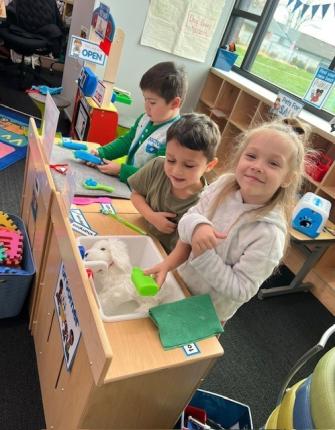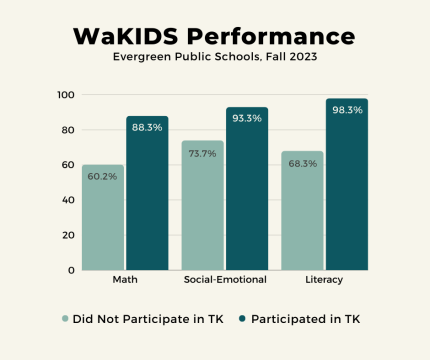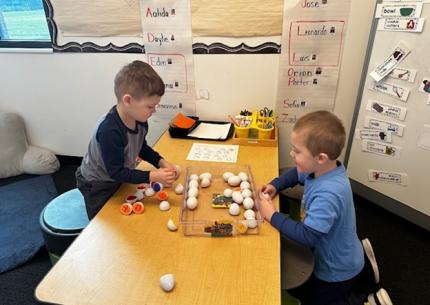Media Contact
Katy Payne she/her
360-764-0201
Dana Shrock’s classroom isn’t just desks and a whiteboard. It has a movement area with obstacle courses and trampolines. It has a math area with games and books. And one area of Shrock’s classroom has been a bakery, a pet shop, and a garden.

She has designed her classroom this way because her students are 4-year-olds participating in her school district’s Transition to Kindergarten (TK) program. At that age, children learn by playing, Shrock said.
“Play is the vehicle [for] everything,” Shrock said. “A lot of times, they don’t realize they’re learning. They’re playing, but with high-quality games and high-quality toys.”
In TK programs, school districts use a screening process to identify and serve children who need additional preparation to be successful in kindergarten the following year. Across Washington, 144 school districts offered TK programs that served more than 5,000 students during the 2023–24 school year.
Shrock, who has taught preschool through fourth grade since 2000, is in her second year of teaching TK at Evergreen Public Schools near Vancouver. She and Gaelynn Mills, the district’s Early Learning Coordinator, credit the program’s play-based approach for the positive impact it’s having on TK students as they enter kindergarten.
All students entering kindergarten in Washington participate in the Washington Kindergarten Inventory of Developing Skills (WaKIDS), an observational assessment that evaluates students’ readiness for kindergarten in six different domains: cognitive, language, literacy, math, physical, and social-emotional. Fall 2023 data from Evergreen Public Schools show that kindergarteners who participated in TK outperformed their peers in at least three domains of WaKIDS.
“When they came into kindergarten [this] year, they came in as confident learners and leaders,” Mills said.
The school district tracks TK students’ literacy, math, and social-emotional readiness, the three domains of WaKIDS that have been identified as “vital signs that would indicate the growth that we wanted to see,” Mills said.
In literacy, 98.3% of kindergarteners who participated in TK exhibited readiness, compared to 68.3% of kindergarteners who did not participate in TK. In math, 88.3% of kindergarteners who participated in TK exhibited readiness, compared to 60.2% of their peers. And in social-emotional readiness, 93.3% of kindergarteners who participated TK exhibited readiness, compared to 73.7% of their peers. The gains in each domain for students who participated in TK were 30 percentage points, 28.1 percentage points, and 19.6 percentage points, respectively.

The students benefiting from these gains are those who don’t have access to other high-quality early learning opportunities, Shrock and Mills said.
“There’s kids that are here that would not have these experiences that wouldn’t be as ready for kindergarten as they could be,” Shrock said. “It’s not because they’re not capable, it’s just because they don’t have the exposure. … I think all kids deserve access to learning.”
Across Washington, access to preschool is a challenge in many communities. According to the National Institute for Early Education Research (NIEER), 75% of Washington’s 4-year-olds did not access preschool during the 2022–23 school year.
State- and federally-funded early learning programs are available to families who meet specific income requirements. Evergreen Public Schools has been surveying families on their interest in preschool programs since 2015, Mills said, and that interest is one of the reasons that the school district created their TK program three years ago.
“We know that a lot of children can’t access programs, either because they don’t qualify for those that are free or they can’t afford the community private, tuition-based programs,” Mills said. “TK was an effort to fill that gap.”
Katie Plamondon, a kindergarten teacher in the same school where Shrock teaches, said many of her students enter her classroom without preschool experience. She said she was “thrilled” when TK was introduced.

“We get kids who are just in our area and that feed into our school, so those kids [are] getting the opportunity to be familiar with our school and the school setting and the some of routines at school,” Plamondon said. “It’s phenomenal.”
This year was the first that Plamondon had students in her class who had participated in TK. Along with their skills in literacy and math, she said she also saw that they knew how to manage their feelings, work with their peers, and make friends. And because the former TK students already knew the school, they were able to help new students get acclimated.
“It was nice this year to have those leaders in your classroom that the kids could look up to,” Plamondon said.
Evergreen Public Schools will offer more TK classes during the 2024–25 school year, and more school districts across the state are also expected to offer TK programs next year. Samantha Bowen, Executive Director of Early Learning at the Office of Superintendent of Public Instruction (OSPI), said that expanding access to early learning opportunities is the right thing to do for Washington’s youngest learners.
“Every child is unique, and that's what makes them amazing,” Bowen said. “We need to meet children where they are, and create programs and early childhood experiences that fit with the family. I think TK is part of that.”






